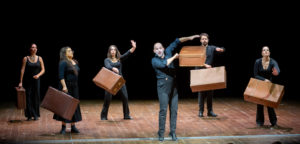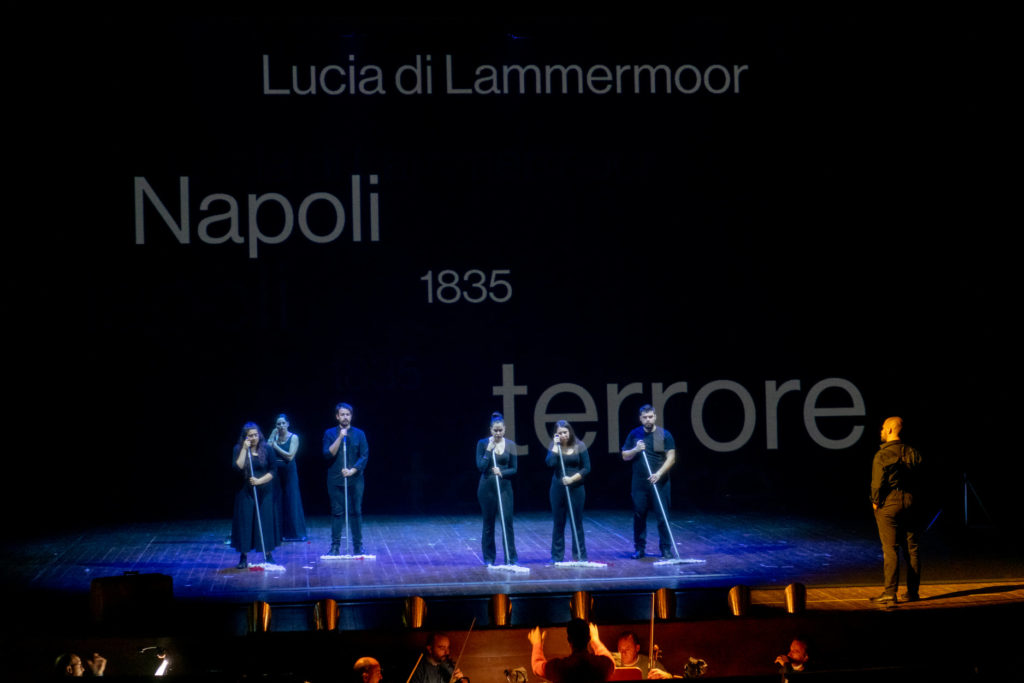
Donizetti Opera Festival 2021 Review: C’erano una volta due bergamaschi…
Alex Esposito Headlines New Theatrical Show
By Mauricio VillaThe Donizetti Opera Festival opened with its newly created show, “C’erano una volta due bergamaschi…” The show was headlined by international opera star Alex Exposito and showcased parallels between his career and Donizetti’s. Overall it was a presentation full of stagecraft.
When you look at Esposito and Donizetti’s careers, both were born in Bergamo, had bass voices, started their careers with Mozart, and left Bergamo searching for a successful career. These parallels were important in creating a context for what was to come.
Throughout the evening, the show displayed theatrical techniques such as projections, the absence of proper sets and costumes, and brilliant use of the lighting while Esposito sang parts from his repertoire. These were also evidenced while participants of the Bottega Donizetti (a Donizetti workshop for singers organized by the Donizetti Foundation) performed. The show also played with duality and ambiguity while describing Esposito and Donizzeti’s careers. There were several speeches in which it was not clear if they were talking about the bass or the composer. There was even a moment when they compared the cholera and syphilis outbreak in the 19th century which affected Donizetti’s compositions with the COVID pandemic which shut down theaters around the world for months. There was also a moment that connected the two to the great conductor Gianandrea Gavazzeni who was also born in Bergamo.

A Varied Repertoire
The evening also included wisely chosen repertoire that seem to connect well. Esposito began with Dulcamara’s entrance recitative, “Udite, udite o rustici!” from “L’Elisir d’Amore” which he sang a capella and off stage, and continued with fragments from Offenbach’s “Scintille, diamant,” Mozart’s “ Non piú andrai” and “ Pa-pa-pa-pa-pagena.” There were also portions from Boito’s “Son lo spirito che nega,” Berlioz´s “Voici des roses,” Donizetti’s “Messa di Requiem,” and “Anna Bolena.” Throughout these musical excerpts, Esposito displayed a hypnotic stage presence, the flexibility of his velvety dark voice, his fluid phrases, and his ability to sing such a diverse repertoire with diverse colors. His performance culminated with a cold menacing interpretation of Henry VIII from “Anna Bolena” once again showcasing why he has become such a big star.
Throughout the evening sopranos Rosalia Cid and Laura Ulloa, mezzo-sopranos Ester Ferraro and Angela Schisano, tenor Omar Mancini, and baritone Lodovico Filippo Ravizza from the Donizetti workshop interpreted portions from diverse pieces like the Norina and Malatesta duet from “Don Pasquale,” Berlioz’s “Le spectre de la rose,” and several fragments from “Anna Bolena,” including the concertante that concludes the first act.
Among the most memorable moments was the hair raising and extremely moving “Oh! Qual funesto” from “Lucia di Lammermoor.” Here all the artists sang a capella and it sounded like a lamenting requiem. The aforementioned Bolena concentrate was exciting and dramatic while the scene “Ei corregge ogni difetto” from “L’Elisir d’Amore” was cheerful.
Throughout the pieces, the singers were vocally perfect in style, had bright sweet timbres, and their voices blended nicely while singing in an ensemble. It was clear that the main intention was not to showcase the singers as soloists but to create a theatrical show that was more like an accompaniment to their maestri on stage. As a result, it was very difficult to have a general opinion about their voices and left this critic wanting more.
The singers were accompanied by the Donizetti Opera Ensemble formed by pianist Michele D’Ellia, violinists Massimo Spadano and Francesco Salsi, violist Christian Serazzi and cellist Andrea Cauvuoto, and the texts were narrated by Francesco Micheli, director of the festival.
In all, the Donizetti Festival managed to create a meaningful show that linked all the musical numbers offering a true theatrical experience.


